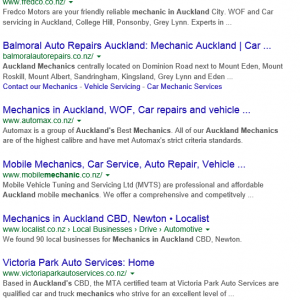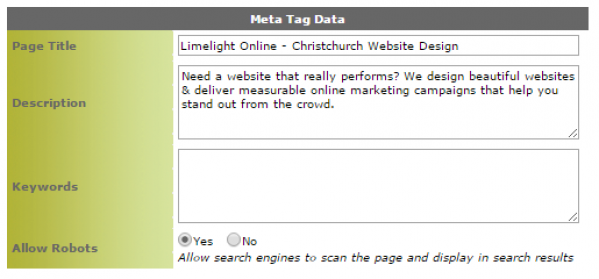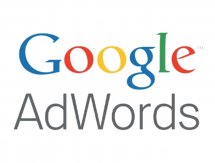BLOG
Editing Google's Information about Your Website
Ever wondered how your company details and data are displayed in Google’s search results? The good news is that you actually have the ability to change your company details and data that gets displayed. Let’s take a look at an example, say for ‘mechanics in Auckland’

We get a result that looks something a little like this – excluding the AdWords campaigns.

So, how do you make the most of what is displayed?
Our first task is to ensure that the meta page title – that is what is in the blue font, accurately represents your business. It is the first point in which you need to capture the viewer’s eye so needs to be accurate, succinct and leave no ambiguity as to what and who you are. In the example below, the business has decided to plug keywords into their meta page title – rather than just a generic Fredco Motors | Auckland.
The meta page title is one of the most important ‘on page’ ranking factors in Google’s algorithm – these should be written with users and search engines in mind.
Moz.com identified that it is important to place the important keywords to the front of the title tag, as this supports better ranking for keywords and of course greater relevance to the user who is more likely to click them.
Google will read the complete title when indexing, but for aesthetic reasons only displays a certain character length in their search results listings. There is absolutely no right or wrong way, and each case (business case) will be different. If you’re unsure of what approach to take, give us a call to discuss and we can guide you in the right direction.

The second element we need to focus on is the meta description, which is the grey text underneath the meta page title and website URL. It is important that it accurately represents the business and uses a short snippet that not only encapsulates your products and services, but also encourages the user to click.
“The meta description should employ the keywords intelligently, but also create a compelling description that a searcher will want to click. Direct relevance to the page and uniqueness between each page’s meta description is key.”[1]
Though the meta descriptions are not a factor in Google’s algorithm, the meta description is extremely important. It is vital that these are written purely with users in mind to foster greater click through rates (CTR).
You may note in the example search results above, the meta descriptions tail offs. Like the meta page title, google will ‘read’ the complete description but only display a certain character length. Whenever possible we recommend sticking to the character limits and making this your statement piece.
And when completing the meta page title and meta descriptions, be sure to include the potential keywords that your customers will use when searching – but only where its applicable and makes sense to do so. For example, if you deal with water coolers, such as the process of restocking, cleaning or replacing, you might be overseen in the search result if you called yourself a water hydration specialist. It is important to put yourself in the shoes of your potential customers. What terminology would they use to describe (and search for) you?
But how do I this?
It really is simple. This can be altered directly in your website’s Content Management System (CMS) and for our Orbit clients, here’s a step-by-step guide to show you how truly easy this can be.
Let’s take the current Limelight Online search result and see how we have got to this.

Log in to your Orbit account and in the left hand panel select Page Editor. From here, you can select the page that you want to alter the details for.
This will now open the page that you can manipulate the data on. Along the top you have five tabs, select the Meta Data tab.
In the case of Limelight Online, I can now go in and alter the content.

For example, if Limelight had an office in Wellington, we might alter the Meta Tag Data to reflect this – if our page was about the Wellington office!
Page Title: Limelight Online – Wellington Website Design
Description: Looking for website specialist in Wellington? Look no further for a beautiful website and measurable online marketing campaigns that will ensure you stand out from the crowd.
One thing to also keep in mind is your character limits.
Moz.com identifies that “Google typically displays the first 50-60 characters of a title tag, or as many characters as will fit into a 512-pixel display. If you keep your titles under 55 characters, you can expect at least 95% of your titles to display properly.”
In the case of the meta description, the description should be optimally be between 150-160 characters, so aim for 155 characters.
Remember to test your new descriptions through search. You can then look to see how they visually show in the search results and whether you need to make some adjustments.
The disclaimer
Even though we can do everything in our power to make it easy for Google to just replicate what we want it to, occasionally our efforts can be thwarted. Search engines may choose to display a different title than what you provide – titles can be rewritten by Google to match your brand, the user query, or other considerations.[2]
Summary
You don’t need to suffer through what Google returns in a search result; you have the ability to alter a page’s meta page title and meta description. Simply by making some minor tweaks in your CMS you can provide a better representation of the business and its page which could potentially relate to higher click through rates and greater engagement with your content.
Image Credit:
Which? Conversation (2012). Google! My privacy’s worth more than a few crummy gift cards.







